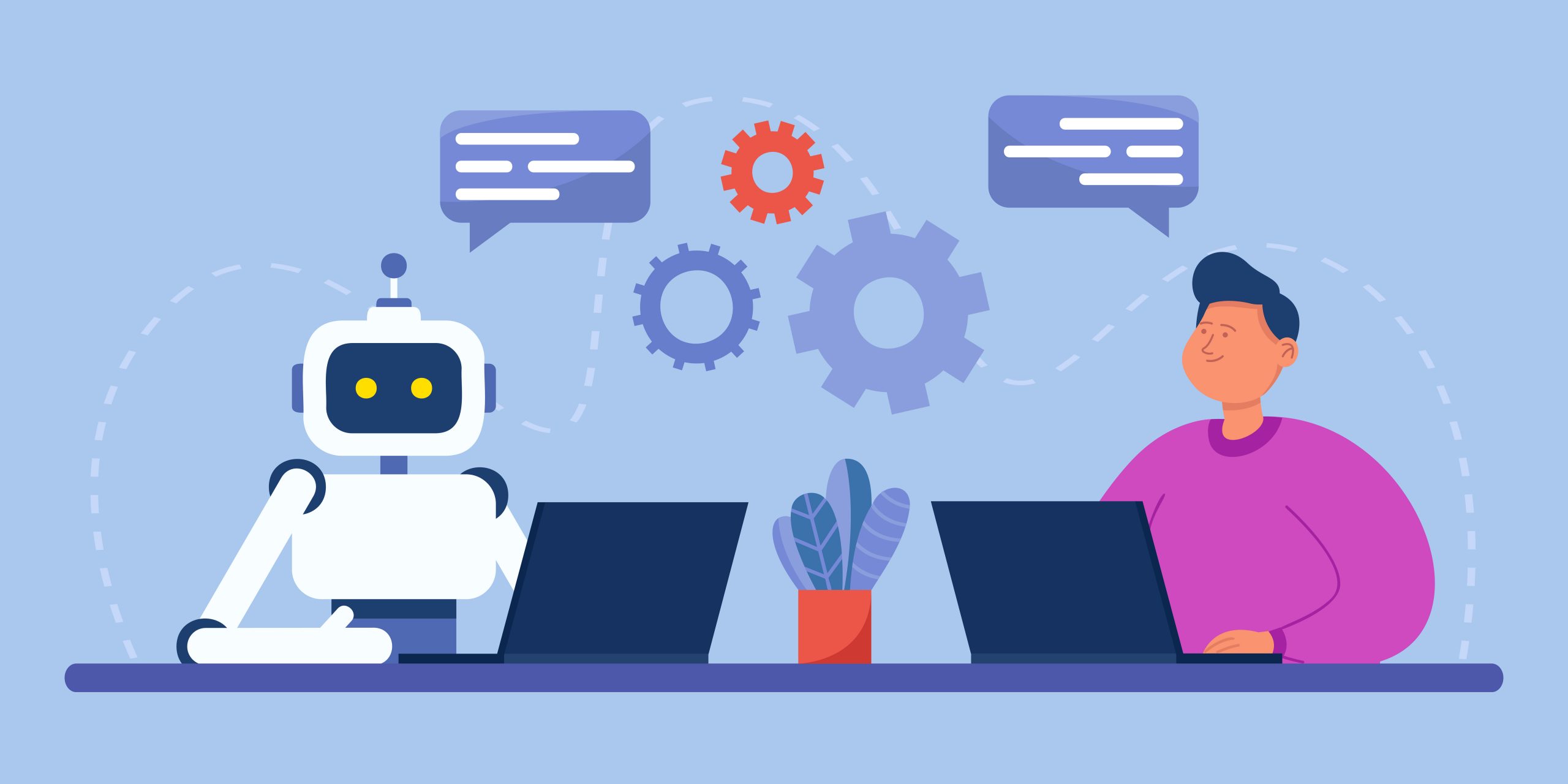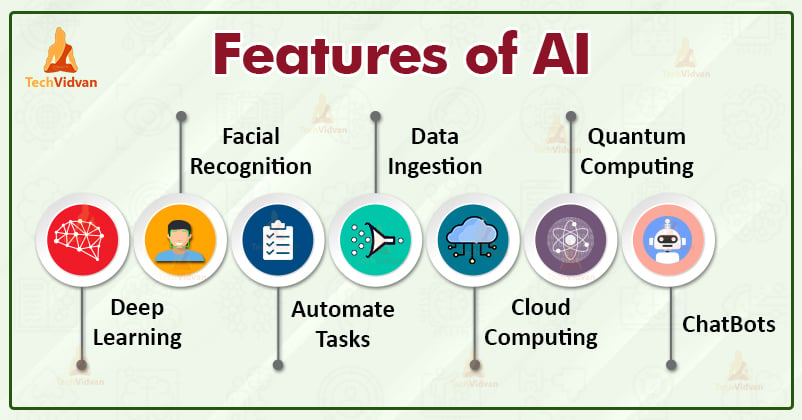
What is artificial intelligence?
Artificial Intelligence (AI) is a branch of computer science that focuses on creating machines and systems that can perform tasks that normally require human intelligence, such as visual perception, speech recognition, decision-making, and language translation. AI has been around for decades, but recent advancements in technology have allowed for more advanced and sophisticated AI systems.
There are two main types of AI: narrow AI and general AI. Narrow AI, also known as weak AI, is designed to perform specific tasks, such as recognizing faces in photos or translating languages. These systems are trained on specific data sets and can only perform the tasks they have been designed for. On the other hand, general AI, also known as strong AI, is designed to perform any intellectual task that a human can. It is still in the early stages of development and is the focus of much research and development in the coming year.
Features of Artificial Intelligence
There are numerous of different AI adoption strategies. TechVidvan describes 7 main features and characteristics of AI that is most common nowadays in most business sectors.

Deep learning refers to a machine learning technique that teaches computers to do what comes naturally to humans, such as autonomous vehicles, computer vision, or automatic text generation, Facial recognition is considered as recognizing individual faces using biometric mapping. Task automation and data ingestion are basically made for AI models because it helps neural networks, analyzes a large amount of such data, and help in providing a logical inference from it. Chatbots are computer programs that open a window for resolving client issues via audio or text input. The bots used to only reply to particular orders in the past.
Artificial Intelligence trends for business
Edge AI
The deployment of AI algorithms and models at the edge devices, to process data locally, will become increasingly common. Edge AI refers to the deployment of artificial intelligence algorithms and models on edge devices, such as sensors, cameras, and IoT devices, to process data locally. This allows for real-time data analysis without the need for sending data to a remote server, which can reduce latency and increase privacy. Edge AI enables a wide range of applications in various industries, such as smart homes, industrial IoT, autonomous vehicles, and more. The growth of edge AI is being driven by the increasing amount of data generated by IoT devices, the need for real-time decision-making, and the limitations of cloud-based AI systems in terms of connectivity and cost. With edge AI, businesses can take advantage of AI technologies to improve efficiency, reduce costs, and gain new insights from their data.
Explainable AI
With the increasing use of AI in critical decision-making processes, the demand for explainable AI will grow. Explainable AI (XAI) refers to the development of artificial intelligence systems that can provide human-understandable explanations for their decision-making processes. XAI is becoming increasingly important as AI is used in more critical decision-making applications, such as medical diagnosis, financial risk assessment, and criminal justice. The lack of transparency and accountability of traditional AI systems can lead to biased or incorrect decisions, which can have significant consequences. XAI aims to address these concerns by providing explanations for the decisions made by AI systems, making it possible for stakeholders to understand and trust the decisions made by AI.
AI-powered virtual agents
Another one of the AI trends for 2023 – is AI-powered virtual agents. It will continue to gain popularity as companies look for new ways to interact with customers and improve customer experience. AI-powered virtual agents are computer programs that use artificial intelligence technologies to simulate human-like conversations with customers. These virtual agents can handle a variety of customer interactions, such as answering frequently asked questions, providing product information, and helping with problem resolution. AI-powered virtual agents can be integrated into websites, mobile apps, and messaging platforms, making it easier for customers to interact with businesses. The use of AI-powered virtual agents can help businesses improve customer experience by providing fast and convenient access to information, reducing wait times for customer service, and freeing up human agents to handle more complex tasks.
AI-powered automation
AI-powered automation, such as robotic process automation, will become more prevalent as companies seek to streamline business processes and increase efficiency. AI-powered automation refers to the use of artificial intelligence technologies to automate various business processes. This includes robotic process automation (RPA), which involves using software robots to perform repetitive tasks, and intelligent process automation (IPA), which involves incorporating machine learning algorithms to make automation more intelligent and adaptive. AI-powered automation can improve efficiency, reduce errors, and free up human employees to focus on higher-value tasks.
AI in healthcare
AI technologies will continue to play a major role in healthcare, with applications ranging from medical imaging to drug discovery and precision medicine. AI in healthcare refers to the use of artificial intelligence technologies to improve the delivery of healthcare services and medical research. AI has the potential to revolutionize healthcare in a number of ways, from medical imaging and diagnosis to drug discovery and personalized medicine. For example, AI can be used to analyze medical images, such as X-rays and MRIs, to identify diseases and conditions more accurately and efficiently. AI can also be used to develop more effective treatments by analyzing large amounts of medical data and identifying new drug targets. In addition, AI can be used to improve patient outcomes by personalizing treatment plans based on an individual’s unique genetic and health information. AI can also help healthcare organizations improve efficiency, reduce costs, and provide better patient care by automating routine tasks like appointment scheduling and medication management. Overall, the use of AI in healthcare has the potential to greatly improve patient outcomes and transform the way healthcare is delivered.
AI in financial services
AI will increasingly be used in financial services, such as credit scoring, fraud detection, and algorithmic trading. AI in financial services refers to the use of artificial intelligence technologies to improve various aspects of the financial industry. AI can be used to enhance risk management, improve customer experience, and streamline operations. For example, AI can be used in credit scoring to make more accurate and objective credit decisions, and in fraud detection to quickly identify and prevent fraudulent activity. AI can also be used to optimize investment portfolios and automate algorithmic trading, improving the efficiency and accuracy of financial transactions. Additionally, AI can be used to improve customer experience by providing personalized financial advice and offering real-time support through virtual assistants. The use of AI in financial services is growing as organizations seek to gain a competitive advantage and improve their bottom line. By leveraging AI, financial services companies can improve efficiency, reduce costs, and provide better services to their customers.
Artificial Intelligence in a meeting management
isLucid allows its users to manage their online meetings the easiest way possible. Meeting information management software provides real-time transcription, and enables users to create tasks and meeting minutes within a single click. You can use generative AIs ChatGPT for actionable items after the meeting. Generative AI computes and transforms preferred original content to new expanded content.
Information is being transferred to preferred project management software, CRM or ATS. Meeting transcript files can be uploaded from different online meeting platforms (Microsoft Teams, Google Meets, Zoom). People are informed about the tasks or shared meeting minutes. isLucid meeting information management platform allows users to have all their generated meeting transcript files securely stored in one place.
If you are interested in isLucid digital meeting assistant, you can try it for free: isLucid Download Page
You can also book a demo and get a walkthrough: Book a Demo

